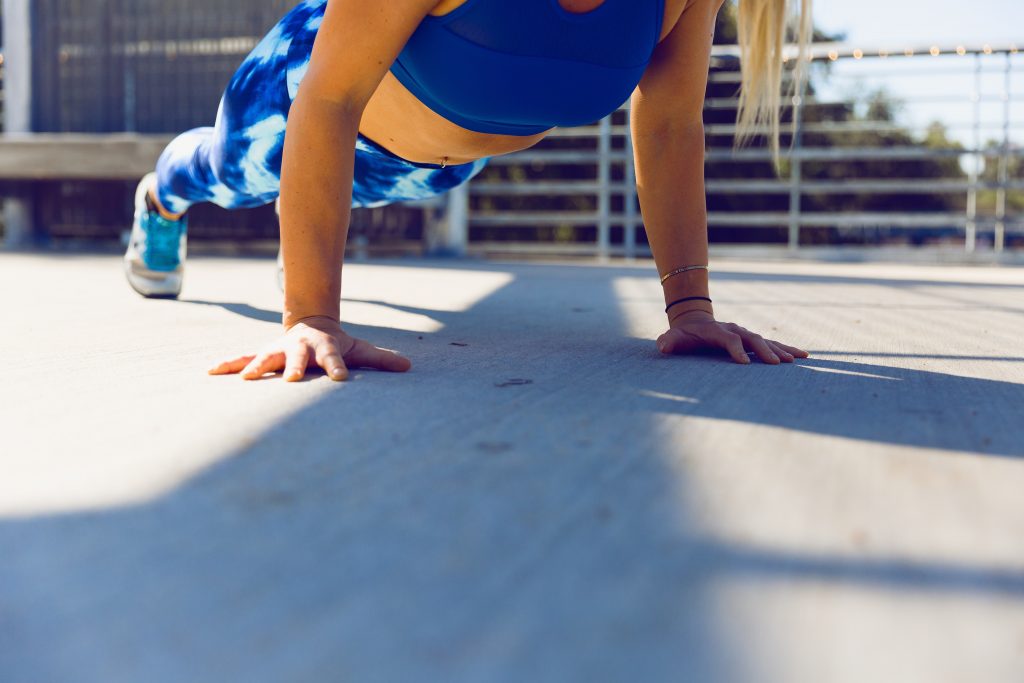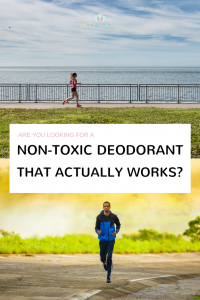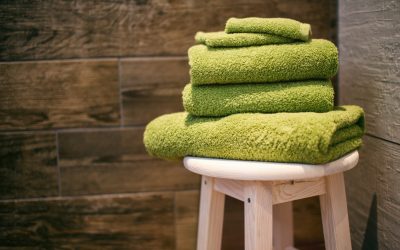Looking for a Natural Non-Toxic Deodorant that Works?
I often get asked the question: what non-toxic deodorant do you use and does it work? Deodorant is one of the first items that gets swapped out in making the switch to a more natural way of living but it can also be the hardest. No one wants to drive their family, workmates or gym buddies away with the strong smell of body odour. So, I’m here to help. I’ve tried a fair number of natural deodorants over the years in my quest to find a non-toxic deodorant that works. What I have found is that generally, pastes, rather than roll-ons or sprays, work really well. It’s not that the latter doesn’t work at all, just that after a while you develop a sort of musty gone-off odour and in conjunction with synthetic nylon or polyester gym clothes, it’s a bit off-putting!
Let’s examine the reasons mainstream conventional deodorants are not a good idea.
Deodorant versus antiperspirant
It’s important to know that a deodorant is not the same as an antiperspirant. Antiperspirants stop you sweating by clogging your pores with aluminium salts, whereas deodorants prevent odour by changing the bacteria on your skin.
Deodorants are commonly combined with antiperspirants to prevent sweating and odour and many chemicals are added to achieve this, including aluminium, triclosan and synthetic fragrances. Aluminium salts constitute up to 25% of the volume of an antiperspirant. Daily and frequent use can result in aluminium toxicity. In a world where aluminium is so abundant (making up 8% of the Earth’s crust) we really need to be doing everything we can to reduce our exposure. It’s a known neurotoxin and is found at higher levels in Alzheimers’ patients.
Why you should switch to a non-toxic deodorant that works
Recent studies have found a concerning link between the use of underarm cosmetic products (containing aluminium salts) and breast cysts/cancer. Whilst there may not yet be absolute conclusive evidence linking aluminium with Alzheimer’s Disease or breast cancer, why take the risk?
I also mentioned triclosan and synthetic fragrances comprising most of our conventional deodorants/antiperspirants. Triclosan (commonly found in hand-washes) has been linked to concerns over antibiotic resistance, endocrine disruption, and mitochondrial dysfunction. Small quantities persist in the environment even after treatment at sewage plants. It affects the algae’s ability to conduct photosynthesis and can biomagnify in the food chain. It’s been added to anti-bacterial soaps because of its antibiotic effect but studies have shown it is no more effective at killing germs than plain old soap and water unless you soak your hands for 9 hours!
Synthetic fragrances deserve a whole blog or book of their own but suffice to say they usually contain chemicals called phthalates, which mimic the hormone oestrogen in our bodies and are linked to breast cancer. They are also common skin irritants and allergens.
Popular amongst teenage boys, aerosol spray deodorants have issues all of their own. Even though ozone-depleting CFCs (chlorofluorocarbons) were removed from aerosols years ago, they still remain laden with petrochemicals such as butane and propane which generate ground-level ozone, a key component of smog.

These aerosols release VOCs (Volatile Organic Compounds) into the air and when inhaled can irritate the lungs, causing breathing difficulties and asthma as well as allergic skin reactions. The oxygen we breathe is replaced by chemicals such as propane or butane and suffocation or fatal cardiac arrhythmia is possible.
A UK coroner found excessive use of aerosol spray deodorants caused the accidental death of an otherwise healthy 16-year-old. Chemicals ten times the lethal limit had built up in his body over many months. If you scan the newspapers, sadly you will find that this occurrence is not all that unusual.
Check out a Material Safety Data Sheet (MSDS) from a commonly used aerosol spray and the disclaimer states that you should never use the antiperspirant without first reviewing the MSDS. I mean who does this? It says ‘use only in well-ventilated places’; but don’t most spray in their bedroom or bathroom, not outside? It goes on to say ‘avoid prolonged spraying and avoid contact with skin and eyes’ but don’t most spray excessively all over the body for months on end. The MSDS also states ‘Breathing of vapours at high concentration may cause dizziness, nausea, vomiting and/or central nervous system depression and loss of consciousness’.
It’s for all of these reasons that natural deodorants (pump, roll-on or paste) are your best bet. If your determined teenager won’t listen, at least open the window, turn on the extractor fan and insist they use the aerosol only in short bursts.
Non-toxic deodorants – what’s the deal?

Natural deodorants contain ingredients that are extremely effective at reducing the bacteria that cause smelly armpits, as opposed to blocking the sweat glands with aluminium salts as conventional deodorants/antiperspirants do. The two I recommend below also contain no alcohol, parabens, propylene glycol, triclosans or synthetic fragrances. Watch out for pseudo-natural deodorants – if you see the world “alum” or if you are using ‘crystals’ the deodorant still contains aluminium. Steer clear!
Alas, back to the point of this article, where to start with natural deodorants. These two I love:
Black Chicken Axilla Deodorant Paste
This deodorant has kept me odour-free whilst training indoors for close to 12 hours during humid 40oC summer days in Perth. It’s so good! Genuinely 100% natural and it’s unisex. Made predominantly from certified organic ingredients such as shea butter, coconut oil, bicarbonate (baking) soda and pure essential oils.
This one is very similar – all natural ingredients such as coconut oil, baking soda, beeswax and pure essential oils. It’s definitely got a more feminine aroma and comes packaged in a lovely reusable metal container. This one has also worked really well for me.
Had issues in the past making the swap to a non-toxic deodorant that works?
There are some who are sensitive to bicarbonate soda in deodorants – the alkalinity is a bit too much for our acid-loving skin. So if you are one of these, look out for the bicarb-free versions from both of these brands. They use alternatives such as arrowroot powder.
A little goes a long way with all these pastes – I use a small pea-sized amount only.
If you have found the switch to natural deodorants a bit frustrating in the past, you might also want to give Detox-A-Pit a try. After years of using antiperspirants, your sweat glands get blocked and loaded with toxicants so you need to clear all that out before your natural deodorant will work effectively for you. Many have found this product has helped them a lot.
One more important point about natural deodorants
Natural deodorants will eliminate body odour but you will still sweat. It’s the nature of the beast. My advice is to embrace your inner primordial self and encourage those around you to do likewise. Your environment and your health will reap the rewards.
Check out my Pinterest where I’ve pinned good natural deodorants! You are also invited to join my private Facebook Group where members share tips, news, and advice on switching to an eco-friendly and sustainable lifestyle.
Related Posts
The Best Natural Pillows For Better Sleep
If you truly want to make a simple upgrade in the bedroom that will change your health then keep reading to find the best natural pillows for better sleep
Why You Should Have a Home Sauna for Better Health
Quite simply if there was a pill that did ALL the things that research is showing us saunas do, you would be taking it. Here’s why and my recommendations
Myth Busting: How Effective Are Air-Purifying Plants?
It’s a common belief that air-purifying plants are an effective way of removing VOCs and toxicants from the air in your home. I’m afraid not, here’s why…






